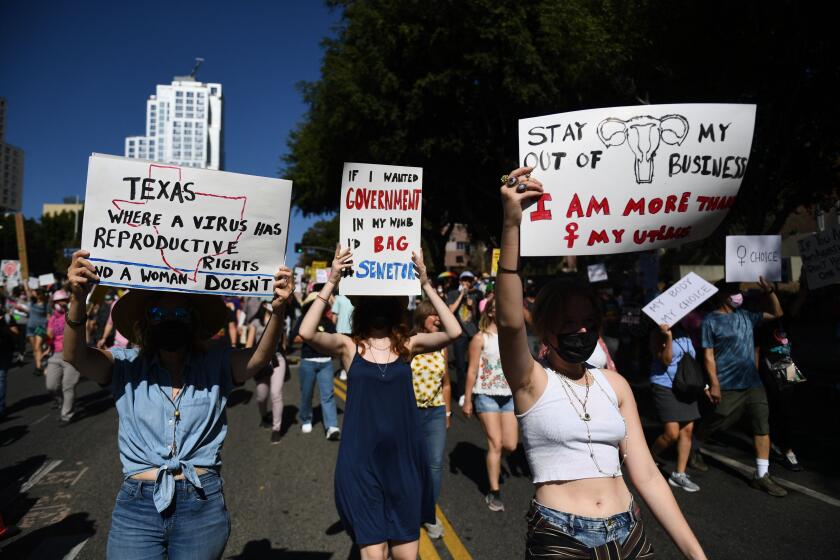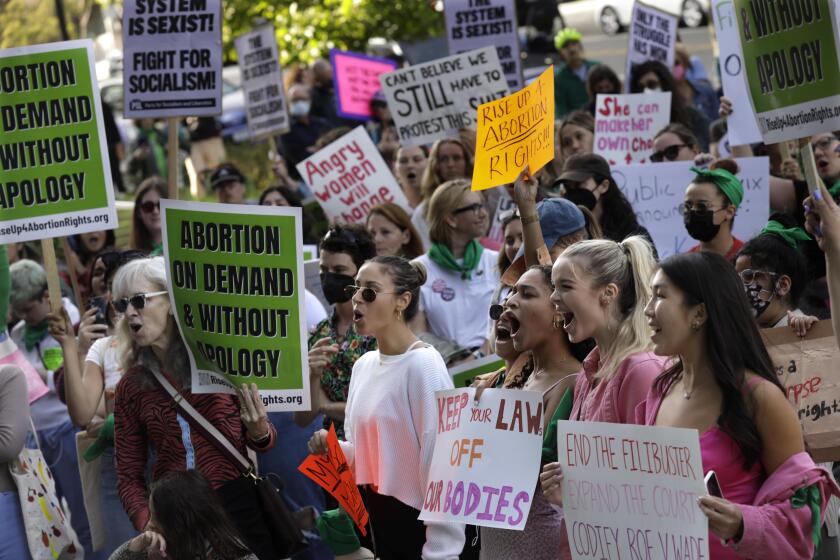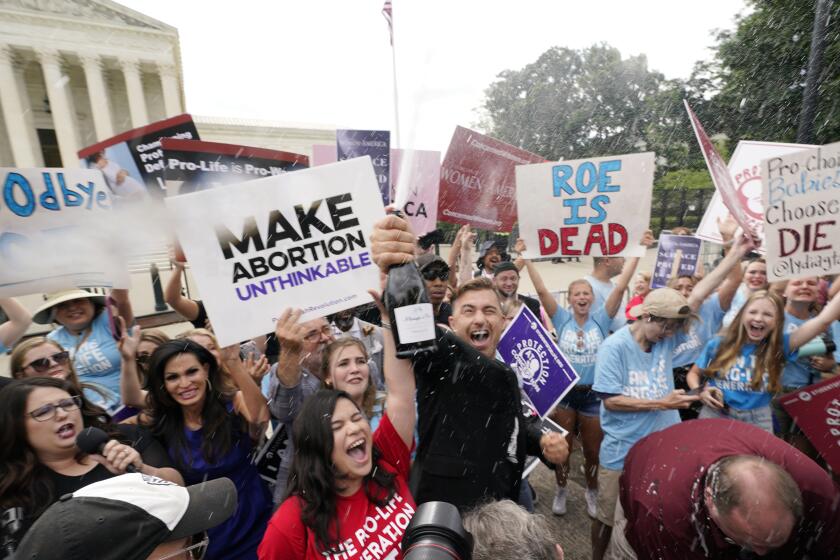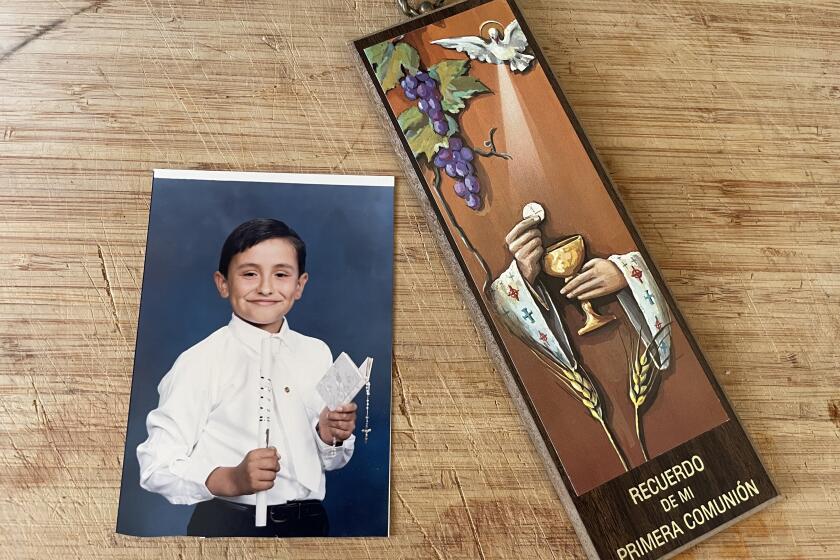Police declare unlawful assembly in downtown L.A. as abortion rights protests wind down
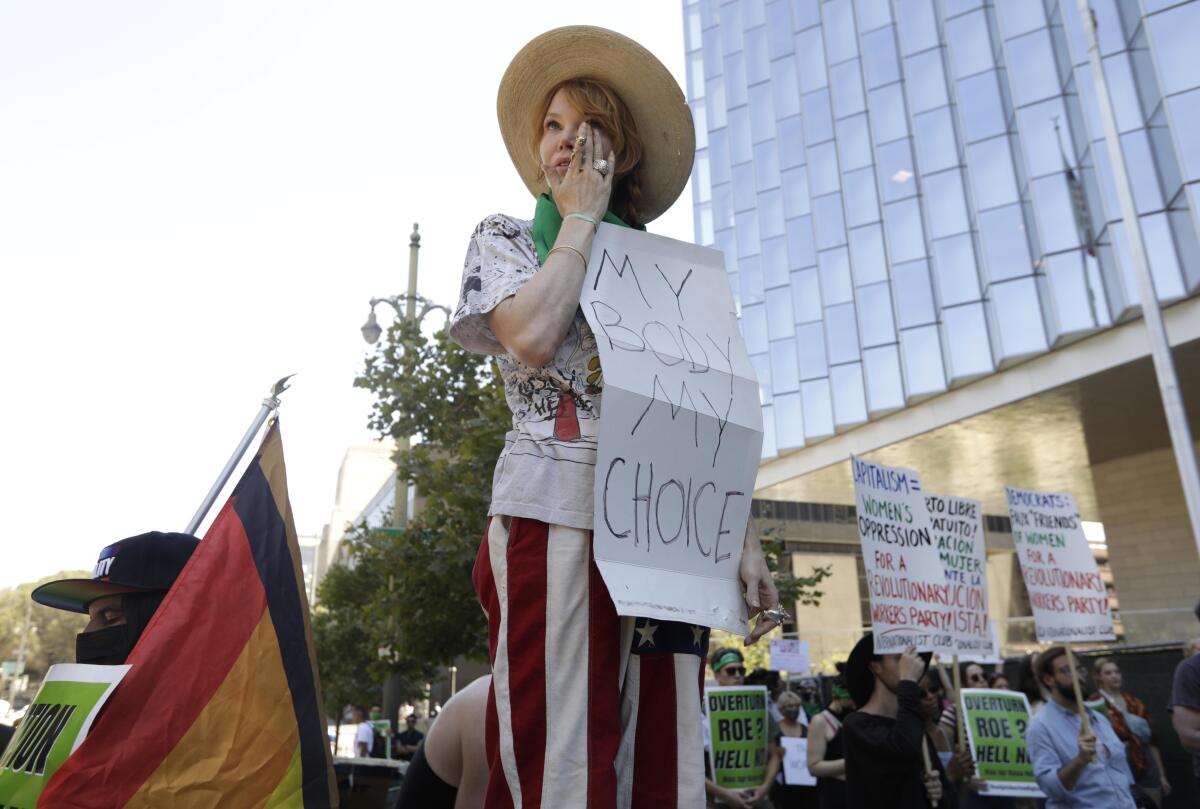
- Share via
As news spread Friday of the Supreme Court’s decision to overturn its landmark 1973 Roe vs. Wade ruling, ending constitutional protections for abortion, thousands of protesters rallied across Southern California.
In downtown Los Angeles, where crowds had amassed at Pershing Square and the federal courthouse, some demonstrators made their way onto the 110 Freeway, temporarily blocking traffic. A different group of protesters clashed with a line of police who tried to block them from advancing down an onramp.
Aerial footage from KABC-TV Channel 7 showed protesters spanning the northbound lanes of the freeway around 7 p.m., marching toward the 101 Freeway. By 8 p.m., protesters had left the freeway. No arrests were made after the freeway was cleared, LAPD Chief Michel Moore said in a news release.
As night fell, protesters and police were on the move throughout downtown Los Angeles.
In video provided to The Times, dozens of protesters chant at 8th and Olive streets as police in riot gear push through the intersection. A firework is launched into the crowd, and some people scatter.
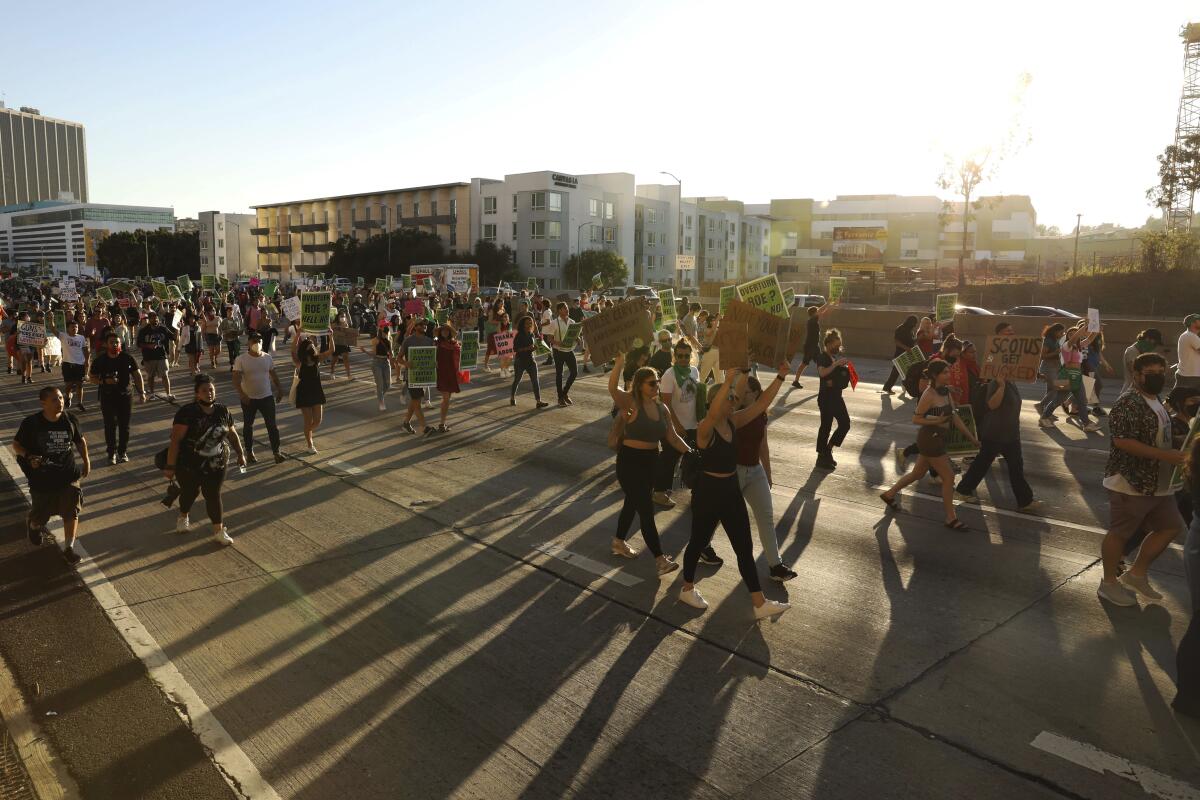
By 9 p.m., the Los Angeles Police Department declared an unlawful assembly, and officers formed skirmish lines in the area of 5th and Main streets.
Police warned protesters left in the area that they would be arrested and subject to the use of projectile weapons if they remained. Times reporters were turned away and not permitted to observe detentions or arrests.
One person was arrested after people threw fireworks and other objects at police officers around 5th and Main, Chief Moore said.
At 10 p.m., the LAPD said Main Street between 3rd and 5th streets had been reopened, and most protesters had dispersed by 11 p.m.
The vast majority of protesters were peaceful, but “a much smaller group of individuals took to the streets with the intention of creating chaos and destruction,” Moore said.
States will now be permitted to ban abortions for the first time since the landmark Roe vs. Wade decision in 1973. What does this mean in California?
Earlier Friday, Francisca Romero, a 25-year-old actress from Uruguay, described the Supreme Court decision as a tipping point in the country as she stood with the growing crowd outside the federal courthouse around noon.
The green bandana tied around her neck was similar to the ones worn by women’s rights activists in Mexico and Argentina when they fought for abortion rights, she said. Other volunteers and organizers wore their own green bandanas printed with the words “Overturn Roe? Hell no!”
“To me it feels like we’re going back in time,” Romero said. She couldn’t believe this moment was happening in the United States.
The crowd outside the courthouse quickly grew to more than a hundred people, then more than 200. Inside the federal courthouse, security officers directed departing jurors to use the building’s back exits.
Rebecca Hairston, 38, of Hollywood, said she woke up in “devastation” that a right she grew up with would no longer be protected nationwide.
“I never thought I would have to protest for abortion rights at my age,” she said. “I grew up knowing that I had the option — I grew up knowing that if I needed it, it was there.”
Now, she says, she’s “heartbroken” for young Americans who won’t grow up with the same protections.
“This is a point we can either mobilize and come together and say, ‘Enough is enough. We won’t stand for it.’ Or we’re going to sit back and be complacent to violence,” said Becca Waite, a 34-year-old organizer with Rise Up 4 Abortion Rights and a traveling emergency room nurse currently working in Orange County.
Here’s everything you need to know about the U.S. Supreme Court’s decision on Roe vs. Wade.
For Denise Meyer, a retired educator wearing a “Bans Off My Body” T-shirt, Friday’s decision was a portal back in time to just after she graduated high school in Long Beach. Meyer, 78, recalled her experience helping a pregnant teenage friend seek an abortion in the days before Roe.
“I asked around, asked my friends, and I found someone who could take her to Mexico. And we drove to Mexico for an illegal abortion, and it was a horrendous experience,” Meyer said. “I would never wish that on anybody.
“People are going to have abortions whether it’s legal or not,” Meyer said.
For several minutes outside the federal courthouse, speakers shared why they were there. One person encouraged churchgoers to challenge their fellow Christians. Another urged people to protest and donate to help women and nonbinary people access abortions.
Liseth De Leon, 23, spoke publicly for the first time about the abortion she had just two weeks ago. The decision from the Supreme Court made her angry.
“What if I was a different person born in a different state?” she told the audience. “I found so much strength and peace in the fact that I was able to have a choice. Because I knew I wasn’t ready.”
A resident of South Central Los Angeles, De Leon said she felt she couldn’t provide for a child. When she sought an abortion, she told only a cousin and friend.
In sharing her story, De Leon said, she wanted others to know they weren’t alone.
Though abortion will remain legal in California, residents across the state expressed outrage at the Supreme Court’s reversal of Roe vs. Wade.
Lux Dehm, 14, said she attended the protest because she wanted to do something for the women in states where abortion is now illegal.
“I feel useless doing anything else,” Lux said. “And this is like the only thing you can do right now. I’m just here to support other states and try to make a change.”
Sheila Xiao, 30, was hanging banners at Pershing Square before a rally planned for Friday evening. A crowd of about 100 people had gathered by 5 p.m., some holding signs that described abortion as a human right and calling for the Supreme Court to be abolished.
A volunteer for the Party for Socialism and Liberation, Xiao said her group and others had been organizing for months in anticipation of the ruling.
“We knew, just understanding who the Supreme Court was, that the chances of Roe being overturned had been high,” she said.
Many in the crowd were mothers and daughters. Erin Wilkerson showed up with her husband, son and daughter; their family had lived in Singapore for the past two years and returned to the United States last month. The court’s decision, Wilkerson said, made for a shocking return.
“How far backwards we’ve come as a country,” she said.
Wilkerson, 40, considered what the ruling meant for her 8-year-old daughter.
“I think about my daughter as a teenager,” she said. “If she had to make a tough decision or was in a bind and couldn’t get basic healthcare, what do you do? We can’t protect our daughters, we can’t protect our children.”
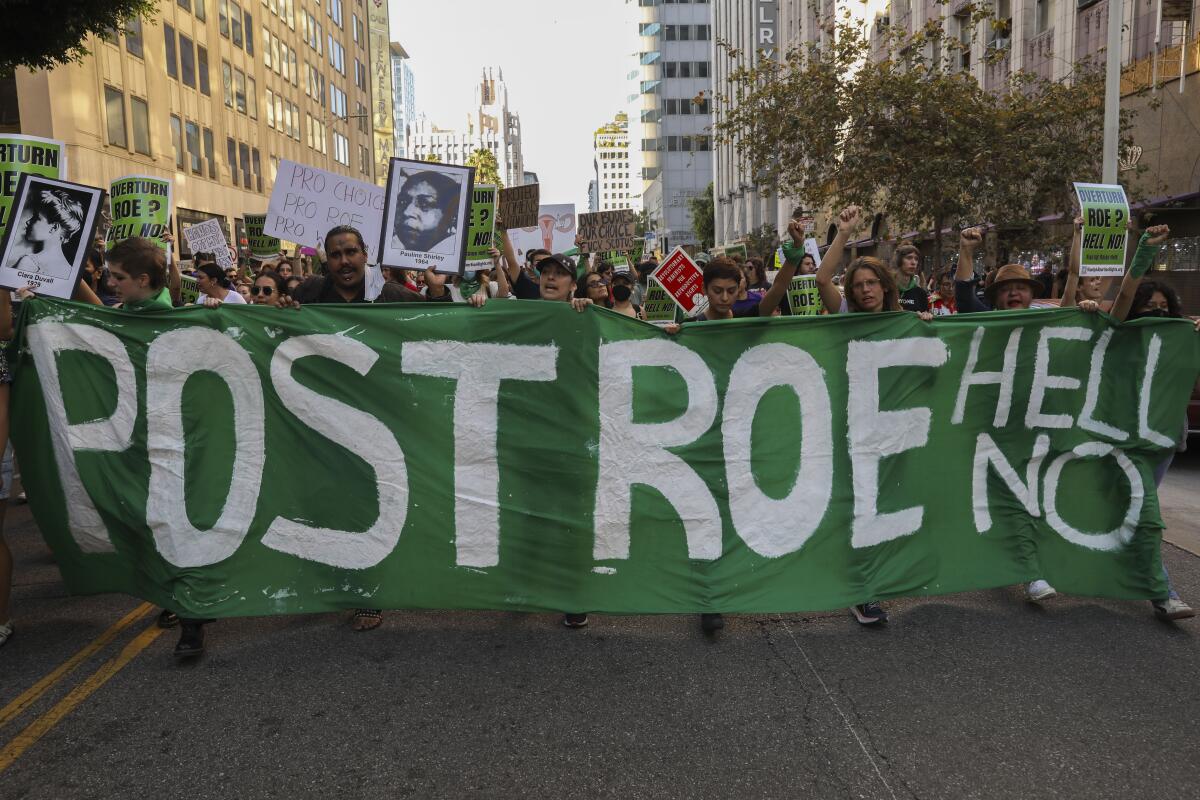
For Emily Zamora, an organizer with the South L.A.-based advocacy organization Labor Community Strategy Center, the ruling was symbolic of everything wrong with American society: a mostly male, unelected body dictating women’s reproductive rights.
While California was somewhat of a “safe haven,” Zamora, 21, said the decision would have immediate consequences elsewhere in the country. For women forced to carry an unwanted pregnancy to term, “the state is not going to take care of them,” she said.
“People need to come together and understand what’s at stake,” she said. “Yes, California is a safe state, but what about everybody else?”
Across town, protesters gathered at the famed intersection of Hollywood Boulevard and Highland Avenue. Giselle Binette held a sign that read, “If my uterus shot bullets, you wouldn’t regulate it. My body, not yours.”
For Binette, 26, “it’s quite personal.” She said she was in an abusive relationship for years with a man who raped her, which led to a pregnancy and her decision to get an abortion through Planned Parenthood.
“I’m very glad I was able to, and I think everybody else should be able to,” she said. “Regardless of why they’re making that decision, it’s their decision, no one else’s.”
A few miles away, Yolanda Lewis stood among a crowd of more than 100 people that filled West Hollywood Park, holding a sign that asked, “If you cut off my reproductive rights can I cut off yours?”
Column: I’m a Catholic kid who supports abortion rights — thanks to my church’s catechism class
I had grown up thinking that abortion was immoral, that anyone who had one would burn in hell. But I immediately saw the film for what it was: propaganda.
Lewis recalled waking up Friday morning to a message from her husband: “Well, the Supreme Court did it.”
At first she thought he was referring to Thursday’s ruling, which struck down laws limiting concealed-carry permits. Then she learned the court had overturned Roe vs. Wade. Within seconds, Lewis said, she was trying to find the nearest protest.
Lewis expressed frustration that elected Democrats had failed to enshrine abortion rights before the Supreme Court’s conservative majority rolled them back but said she’s now motivated to become more active.
“The courts are packed. I think we missed an opportunity to codify this. We didn’t fight hard enough,” she said, “but like I keep saying, this is the beginning again.”
Michelle Renee Clunie, who starred in the television series “Queer as Folk,” told the crowd she had two abortions, one at 23 and another at 29 after a sexual assault.
“I can tell you now that I’ve been a mother for seven years, it is the hardest thing I have ever done. It is the biggest choice you will ever make in your entire life,” she said.
“It is hard even under great circumstances. It is hard emotionally. It is hard physically,” she said. “And it’s not a choice to be taken lightly.
“I woke up this morning, I thought about the journey I would not have had, had I not had the choice to choose how I live my life, what happens to my body, “ she said. “It’s time to take to the street.”
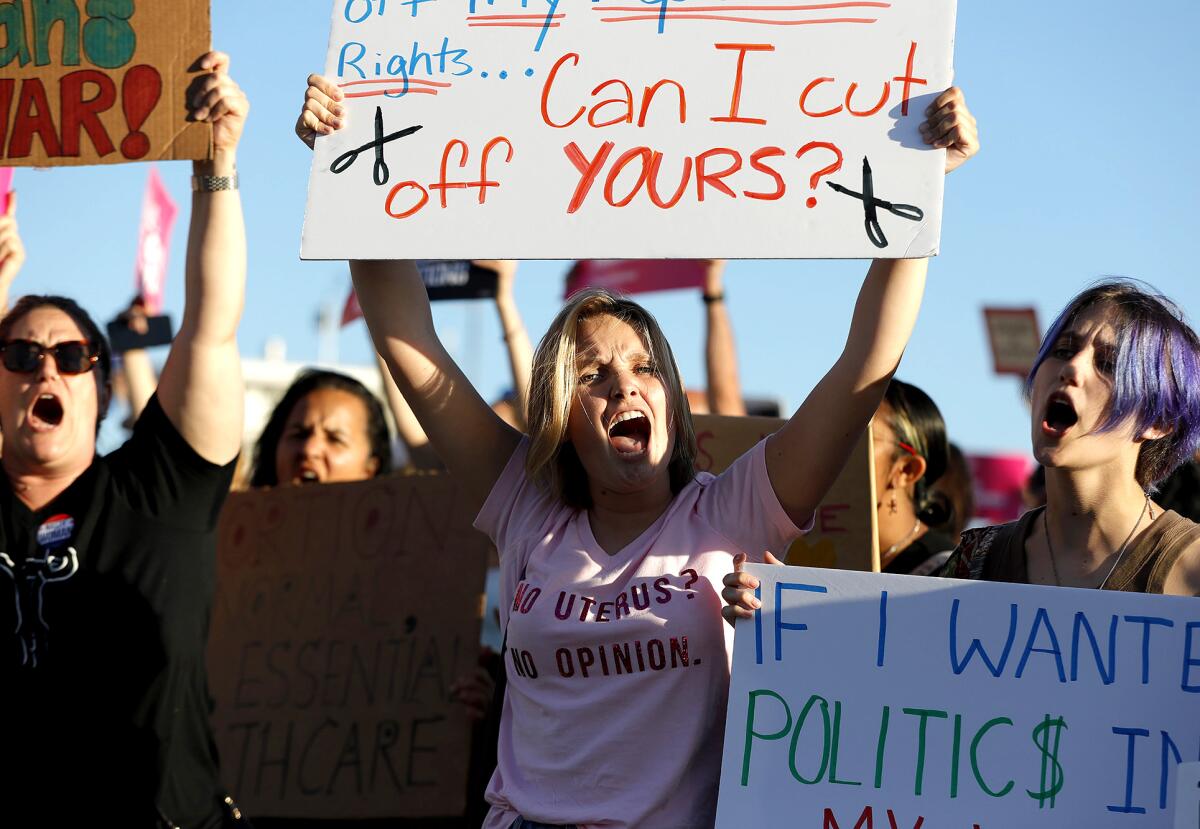
Hundreds more people protested Friday in demonstrations throughout Southern California.
In Laguna Beach, a few hundred people gathered in front of the Main Beach lifeguard tower, far outnumbering beachgoers on the sand.
August Davis, 18, of Los Angeles said the size of the crowd surprised her in what she saw as a more conservative part of California. The moment was “bittersweet” for her given what had resulted in the gathering.
In Palm Springs, more than 100 people stood in scorching heat in the parking lot of a courthouse to listen to speakers — most of whom were not politicians or organizers but crowd members themselves: young and old, gay and straight, male, female and nonbinary — who described what the court’s ruling meant to their lives.
An older woman recalled having to convince a therapist she would be a terrible mother so she could have an abortion before the procedure was legal. A husband remembered scoffing that his wife was “being a little dramatic” when she warned about the fallout from the election of President Trump in 2016. A gay man said it was crucial for other gay men to stand up for women, as they had cared for the sick and dying during the AIDS crisis.
“Tonight — this feels normal. This is all I have ever known,” said Stella Krone, 17, of Idyllwild. “We cannot accept that world. That is unacceptable. We got here through complacency. If we stay here, we will just go backwards.”
Times staff writers David Zahniser, James Queally, Rachel Uranga, Seema Mehta and Matthew Ormseth and Times Community News staff writer Andrew Turner contributed to this report.
More to Read
Sign up for Essential California
The most important California stories and recommendations in your inbox every morning.
You may occasionally receive promotional content from the Los Angeles Times.
